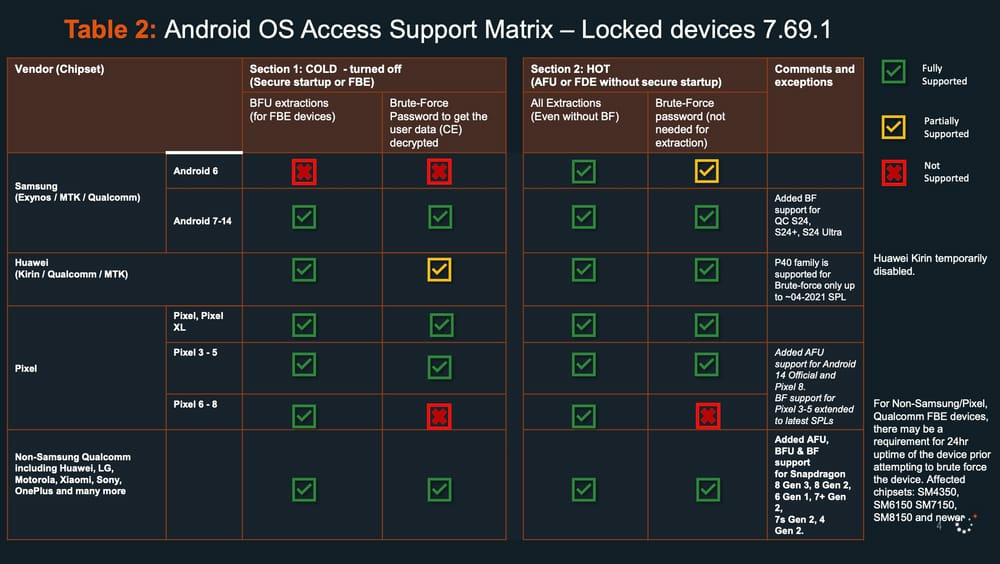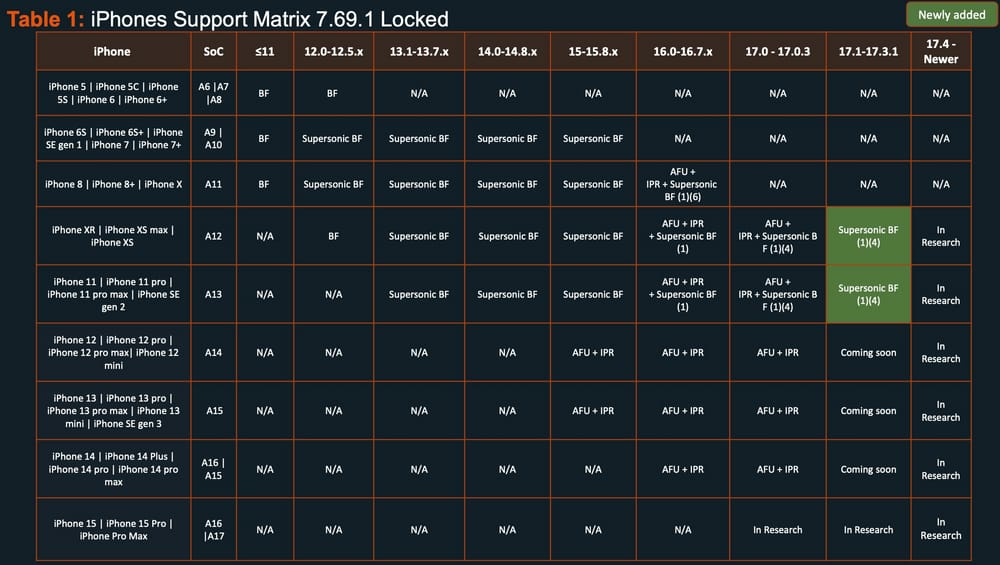Leaked Docs Show What Phones Cellebrite Can (and Can’t) Unlock
The leaked April 2024 documents, obtained and verified by 404 Media, show Cellebrite could not unlock a large chunk of modern iPhones.
Cellebrite, the well-known mobile forensics company, was unable to unlock a sizable chunk of modern iPhones available on the market as of April 2024, according to leaked documents verified by 404 Media.
The documents, which also show what various Android handsets and operating system versions Cellebrite can access, provide granular insight into the very recent state of mobile forensic technology. Mobile forensics companies typically do not release details on what specific models their tools can or cannot penetrate, instead using vague terms in marketing materials. The documents obtained by 404 Media, which are given to customers but not published publicly, show how fluid and fast moving the success, or failure, of mobile forensic tools can be, and highlights the constant cat and mouse game between hardware and operating manufacturers like Apple and Google, and the hacking companies looking for vulnerabilities to exploit.
Analysis of the documents also comes after the FBI announced it had successfully gained access to the mobile phone used by Thomas Matthew Crooks, the suspected shooter in the attempted assassination of former President Donald Trump. The FBI has not released details on what brand of phone Crooks used, and it has not said how it was able to unlock his phone.
The documents are titled “Cellebrite iOS Support Matrix” and “Cellebrite Android Support Matrix” respectively. An anonymous source recently sent the full PDFs to 404 Media, who said they obtained them from a Cellebrite customer. GrapheneOS, a privacy and security focused Android-based operating system, previously published screenshots of the same documents online in May, but the material did not receive wider attention beyond the mobile forensics community.
For all locked iPhones able to run 17.4 or newer, the Cellebrite document says “In Research,” meaning they cannot necessarily be unlocked with Cellebrite’s tools. For previous iterations of iOS 17, stretching from 17.1 to 17.3.1, Cellebrite says it does support the iPhone XR and iPhone 11 series. Specifically, the document says Cellebrite recently added support to those models for its Supersonic BF [brute force] capability, which claims to gain access to phones quickly. But for the iPhone 12 and up running those operating systems, Cellebrite says support is “Coming soon.”
A SECTION OF THE IOS DOCUMENT. IMAGE: 404 MEDIA.
The iPhone 11 was released in 2019. The iPhone 12 was launched the following year. In other words, Cellebrite was only able to unlock iPhones running the penultimate version of iOS that were released nearly five years ago.
The most recent version of iOS in April 2024 was 17.4.1, which was released in March 2024. Apple then released 17.5.1 in May. According to Apple’s own publicly released data from June, the vast majority of iPhone users have upgraded to iOS 17, with the operating system being installed on 77 percent of all iPhones, and 87 percent of iPhones introduced in the last four years. The data does not break what percentage of those users are on each iteration of iOS 17, though.
Cellebrite offers a variety of mobile forensics tools. That includes the UFED, a hardware device that can extract data from a physically connected mobile phone. The UFED is a common sight in police departments across the country and world, and is sometimes used outside of law enforcement too. Cellebrite also sells Cellebrite Premium, a service that either gives the client’s UFED more capabilities, is handled in Cellebrite’s own cloud, or comes as an “offline turnkey solution,” according to a video on Cellebrite’s website.
That video says that Cellebrite Premium is capable of obtaining the passcode for “nearly all of today’s mobile devices, including the latest iOS and Android versions.”
That claim does not appear to be reflected in the leaked documents, which show that, as of April, Cellebrite could not access from locked iOS phones running 17.4.
The second document shows that Cellebrite does not have blanket coverage of locked Android devices either, although it covers most of those listed. Cellebrite cannot, for example, brute force a Google Pixel 6, 7, or 8 that has been turned off to get the users’ data, according to the document. The most recent version of Android at the time of the Cellebrite documents was Android 14, released October 2023. The Pixel 6 was released in 2021.
A SECTION OF THE ANDROID DOCUMENT. IMAGE: 404 MEDIA.
Cellebrite confirmed the authenticity of the documents in an emailed statement to 404 Media. “Similar to any other software company, the documents are designed to help our customers understand Cellebrite’s technology capabilities as they conduct ethical, legally sanctioned investigations—bound by the confines of a search warrant or an owner’s consent to search. The reason we do not openly advertise our updates is so that bad actors are not privy to information that could further their criminal activity,” Victor Ryan Cooper, senior director of corporate communications and content at Cellebrite, wrote.
“Cellebrite does not sell to countries sanctioned by the U.S., EU, UK or Israeli governments or those on the Financial Action Task Force (FATF) blacklist. We only work with and pursue customers who we believe will act lawfully and not in a manner incompatible with privacy rights or human rights,” the email added. In 2021 Al Jazeera and Haaretz reported that a paramilitary force in Bangladesh was trained to use Cellebrite’s technology.
Cellebrite is not the only mobile forensics company targeting iOS devices. Grayshift makes a product called the GrayKey, which originally was focused on iOS devices before expanding to Android phones too. It is not clear what the GrayKey’s current capabilities are. Magnet Forensics, which merged with Grayshift in 2023, did not immediately respond to a request for comment.
Cellebrite’s Android-focused document also explicitly mentions GrapheneOS in two tables. As well as being an operating system that the privacy-conscious might use, 404 Media has spoken to multiple people in the underground industry selling secure phones to drug traffickers who said some of their clients have moved to using GrapheneOS in recent years.
Daniel Micay, founder of GrapheneOS, told 404 Media that GrapheneOS joined a Discord server whose members include law enforcement officials and which is dedicated to discussions around mobile forensics. “We joined and they approved us, with our official GrapheneOS account, but it seems some cops got really mad and got a mod to ban us even though we didn’t post anything off topic or do anything bad,” Micay said.
There is intense secrecy around the community of mobile forensics experts that discuss the latest unlocking tricks and shortcomings with their peers. In 2018 at Motherboard, I reported that law enforcement officials were trying to hide their emails about phone unlocking tools. At the time, I was receiving leaks of emails and documents from inside mobile forensics groups. In an attempt to obtain more information, I sent public records requests for more emails.
“Just a heads up, my department received two public records request[s] from a Joseph Cox at Motherboard.com requesting 2 years of my emails,” a law enforcement official wrote in one email to other members. I learned of this through a subsequent leak of that email. (404 Media continues to receive leaks, including a recent set of screenshots from a mobile forensics Discord group).
Google did not respond to a request for comment. Apple declined to comment.

Oof, that definitely doesn’t look good from a security standpoint.

Exploiting security vulnerabilities is always a game of cat-and-mouse.
It’s best to set your phone to automatically update to the newest software available to keep it secure.
This assumes the official upstream is not compromised. Apple absolutely will push new vulnerabilities in updates when requested so by higher level law enforcement and/or the NSA etc. The FBI is also known to have placed moles in app vendor teams.
I’ve read about the NSA exploiting third-party push notification systems from Snowden. I’ve only read the opposite of your claim about Apple providing a backdoor for the government. Do you have a source so I can read more about it?
Apple is a US based company. They are legally required to comply and not openly speak about it when a court asks them to do so.
Same for Google obviously, but since their software on end-devices is much more diverse, it is much harder to do.
Apple’s legal policy is very clear. They do not have access to data on customer devices, and therefore cannot provide said data to law enforcement or government officials.
They’ve fought the backdoor request in court 11 times and won. They are not mandated to comply by law if they themselves do not have access.
They can and will provide iCloud data in response to a warrant.
https://www.apple.com/legal/privacy/law-enforcement-guidelines-us.pdf
This has nothing to do with what I wrote.
Its not a matter of “have they done it” its just that the US feds can legally force any corporation to do as they please under threat of violence while binding them with gag orders.
Even if there is no proof so far, there is no reason to believe that they havent done so, because they legally can.
Its also specifically disallowed to deploy any kind of system that automatically notifies the public in case law enforcement compromises a companies servers as part of an investigation. Apple used to have such a warrant canary but they removed it some years ago.
See Warrant Canary
They do not have access to data on customer devices. Therefore, they cannot be compelled to provide it. Apple repeatedly challenges and wins cases against the government’s request for a backdoor to their devices.
They can and will provide iCloud data in response to a warrant.
Its a closed source operating system dude, they can do whatever they want. Just because there are lawsuits, doesnt mean they dont have a backdoor to your phone.
They can literally force apple to pretend that they didnt give them a backdoor. There are basically no limits to law enforcement powers as long as they say the word “terorrism”.
I’m not for trusting corporations either, but you don’t have a source, only theories.
Snowden is pretty much the authority on NSA vulnerabilities, and he hasn’t released any proof that Apple has a backdoor on their devices. The only thing he’s demonstrated is how the NSA has used MITM on third-party push notifications, which Apple has since encrypted and relayed to obfuscate.
If you have a source, I’m down to read it. Otherwise, you’re just speculating.
So in short newer Pixel and iPhone models seem to be the most resilient to these attacks, with every iPhone able to run iOS 17.4 (XS/XR or newer) currently not attackable.
But obviously an attacker in possession of the device can wait for an exploit to be found on whatever OS version the device is running.
The by far best protection then is to set a strong passphrase so even if/when your device/OS have known vulnerabilities to allow brute force attacks, the passphrase is too complex to be brute forced in a realistic amount of time.
Can we create a situation where brute force is unfeasible while using 6 digits PIN? That would be nice to have security and convenience at the sametime. Using passphrase isn’t that feasible for me as my Samsung phone randomly prompts for PIN when I need the most.
Can we create a situation where brute force is unfeasible while using 6 digits PIN?
According to this comment from GrapheneOS, the latest Pixels and iPhones are not brute forceable with a 6+ digit PIN:
Pixel 6 and later or the latest iPhones are the only devices where a random 6 digit PIN can’t be brute forced in practice due to the secure element.
Not really. A 6-digit PIN gives you ~20 bits of entropy so it’ll be cracked in no time. The only protection you’re relying on is the hardware and the OS, and according to the Cellebrite compatibility table it’s mostly a question of when a vulnerability is found, not if.
So it’s a trade-off between security and usability.
I use a ten-digit alphanumeric passcode. I rarely have to type it with Face ID.
The main takeaway from this, is not that these phones are absolutely secure now and forever, it’s just that the newer phones are secure… For now.
Most security just buys you time. Might be months, might be years. But it just buys you time.
This is demonstrated that basically any phone older than 2 years is completely breakable. It’s an arms race, and if you own a phone you become a static target.
So if data is absolutely critical, it shouldn’t rely on a low entropy password dependent on the secure element of a phone. That could be fine for things that are ephemeral, things you can change from the cloud, but not say the KFC secret recipe
That’s simply not true. The chart clearly states that Cellebrite cannot break encryption on any iPhone that can run the current version of iOS. That includes any iPhone made in the last six years.
What this illustrates is the importance keeping your phone’s software updated for maximum security. New hardware is not necessary.
Scenario: You have the super secret KFC recipe on your phone. I steal your phone and wait until the cracking tools have caught up to the version that was on your phone. All I have to do is keep it in storage. While your phone is in storage its not getting updates.
By keeping your phone updated you have EXTENDED the time phone security can keep an attacker out of your phone, but in time they will be able to get into it.
I see your point. The attacker would need to be far more savvy than police.
They’d need to keep it charged to prevent powering off and activating the connection access denial of the Secure Enclave, while keeping the iPhone in a Mylar bag to prevent any nearby iOS devices from relaying the Find My remote erase request.
With enough time, a vulnerability may be found for that version of iOS.
Probably not powered on for years. The battery would die at some point. But yes the rest of your statement I agree with, there are protocols for cold case phones, they’re just stored waiting for the cracking to catch up
Cellebrite uses Lightning/USB-C port access to bypass passcode security. Once iPhone is powered off, the Secure Enclave will deny port access until the passcode is entered. It’s not impossible, but it’ll certainly take far longer than if they keep the iPhone charging while they wait for an exploit.
Do they remove/disconnect the battery in this mode? If not wont the battery eventually balloon?
It’s fine if it happens. Balooning is just a chemical breakdown of the battery. It won’t explode. Disconnecting the battery while keeping the device connected to power runs a high risk of shorting, potentially causing component damage.
But apple can
Not phone specific, but signal had a great blog post on cellebrite a while back.
GOS is spooked time to switch to carrier pigeons and live under a bridge with a dolphin.
lol typical isfake company
My Pixel 8 with GrapheneOS , password of 35 digits and USB completely off sends its regards
How to remember 35 digits?
If you use dicewords it’s honestly pretty easy to remember. My master password for bitwarden is over 50 characters and it was a breeze to remember.
I’m even thinking about changing my password, but I’m not sure if dicewords have higher entropy and are more resistant to brute force attack than a password of “random” letters and numbers. What do you think about?
There is a very relevant xkcd for this exact question.
Tldr dicewords are the better option. You can still add numbers, symbols, and capitalize if you really want even more entropy.








